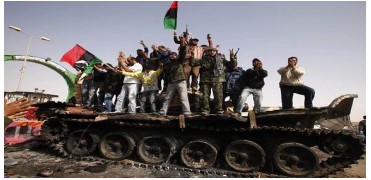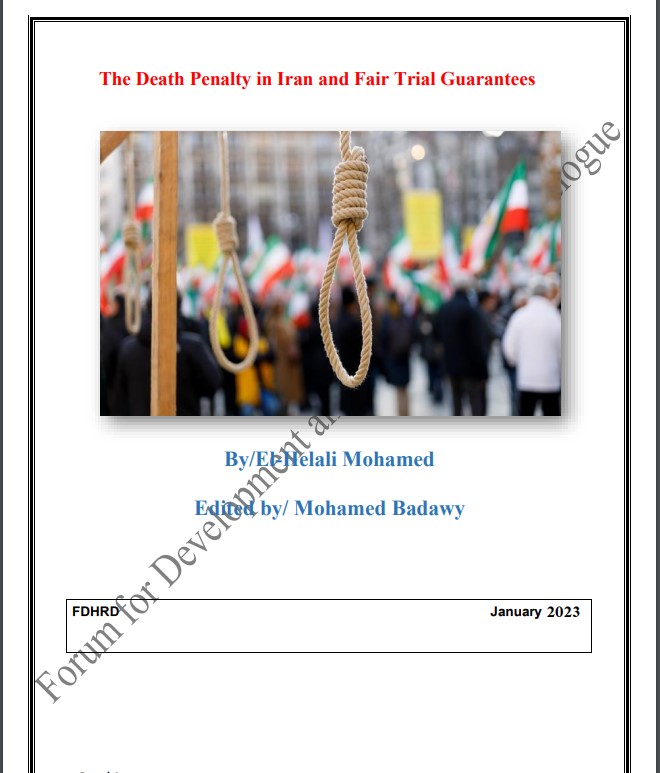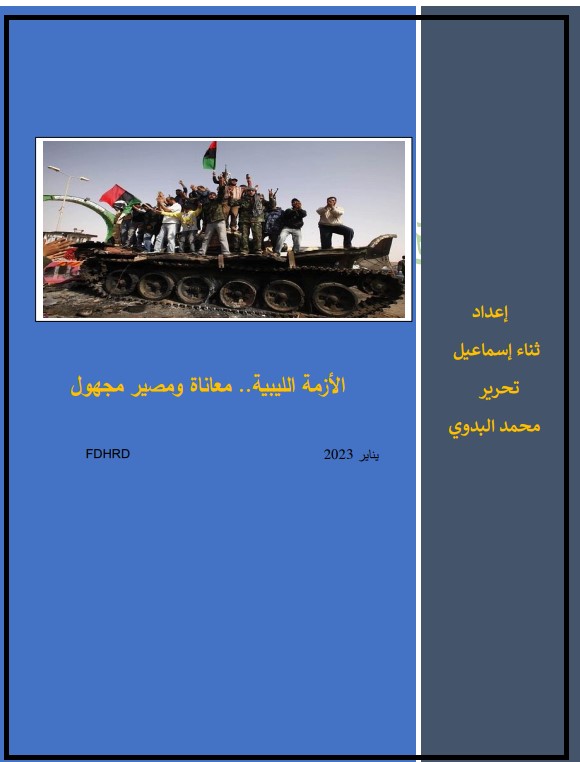Today, Monday 15/1/2022, The Forum for Development and Human Rights Dialogue (FDHRD) issues its report on the Libyan crisis, which deals with the situation inside Libya and the crisis of incompatibility through the following elements: An overview of the conflict in Libya – The impact of the deteriorating situation on the Libyan citizen – The suffering of the Libyan citizen from the crisis – The position of the Arab countries on the crisis – The international position on the crisis – Conclusion and Recommendations.
The report indicated that despite the passage of more than a decade since the popular uprising against the regime of Colonel “Muammar Gaddafi”, Libya has not witnessed any stability. It has become an arena of struggle for armed militias competing for power. This, in turn, summoned regional and international forces, turning the country into a regional arena of conflict. From that, the Libyan citizen alone pays the bill for these conflicts and political divisions that led to a collapse in all fields, including health, education and the economy, a critical shortage of fuel, and the exacerbation of unemployment. Thus, the burdens increased on Libyan families.
The report also indicated that what the Libyan citizen suffers from as a result of political divisions and conflicts between armed militias is a violation of all international human rights conventions. Libya is suffering from political divisions and security unrest, which has plunged the country into continuous conflicts and wars. All of this is happening amid miserable living conditions in various parts of the country due to the succession of crises that burden the citizen. Ten years of conflicts have turned Libya, which has the largest oil reserves in Africa, from a country enjoying plenty, into a collapsing economy whose population has become poor and destitute.
The United Nations Children’s Fund (UNICEF) also announced in 2022 that nearly 32,000 children and girls in Libya suffer from acute malnutrition, indicating that the prevalence rate of acute malnutrition reached 3.8%, While the southern region falls by 6.1% below the Integrated Phase Classification of Food Security level, the organization added that about 70,000 people fall under moderate malnutrition.
The report also recommended the following:
- The necessity of activating the Arab role to reach a solution in Libya, specifically the role of the League of Arab States, so that it is a platform for deliberation and unification of Arab opinions regarding the crisis, and then the adoption of executive mechanisms leading to a comprehensive solution in Libya.
- The need to implement the decisions of international meetings regarding Libya, the latest of which is the decisions of the Berlin Conference, with regard to reaching a comprehensive and permanent ceasefire agreement in Libya, with the implementation of an arms embargo to Libya, and the tightening of land, air and sea control in order to ensure that. This would provide opportunities for a political solution to advance.
- The need to activate the role of the Security Council and the role of the international envoy to Libya in order to unify and lead international efforts to reach a solution in Libya, giving them a clear and decisive role in preventing any external interference in Libya, specifically interventions of a military and armed nature. This is done through strict punitive decisions, mechanisms and procedures.
- The need to direct regional and international efforts towards building governance institutions in Libya, including civil and political institutions, in a fair and satisfactory manner for all Libyan parties. There should also be a focus on building unified security and military institutions, ending the state of chaos and insecurity in the country.
- The need for the Libyan parties to immediately stop all hostilities, strive hard for the success of the political solution, achieve national reconciliation, and show good intentions and sufficient flexibility to achieve a consensus that achieves national partnership. This would end the depletion of the state’s capabilities and open future horizons for advancement and progress.
- The necessity for the Libyan parties to cooperate; To confront the threat of extremism and terrorism, spread the spirit of moderation and the culture of moderation in society, and prevent the provision of fertile ground for extremist groups to spread their ideas and practice their terrorism.
- Libyan officials must bear the responsibility of preserving the country’s unity and preventing it from being divided along political, geographical and tribal lines, in order to avoid the great dangers that could result from tearing the country’s unity apart.
For his part, Saeed Abdel Hafez, the founder of the FDHRD, pointed out the need to agree on the constitutional path and reach an agreement on a constitutional framework and a specific timeline for elections, holding it as soon as possible. All Libyan parties must immediately strive to stop the violence and resort to the language of dialogue.
Thanaa Ismail, a researcher at the FDHRD, also pointed out the need for decisive mechanisms to be established to resolve internal conflicts and divisions that obstructed the process of reform and development in Libya, which the Libyan citizen paid for. The Libyans have the right to enjoy a safe life, free from endless conflicts that affect their livelihood, and for presidential elections to be conducted with fairness and transparency .








